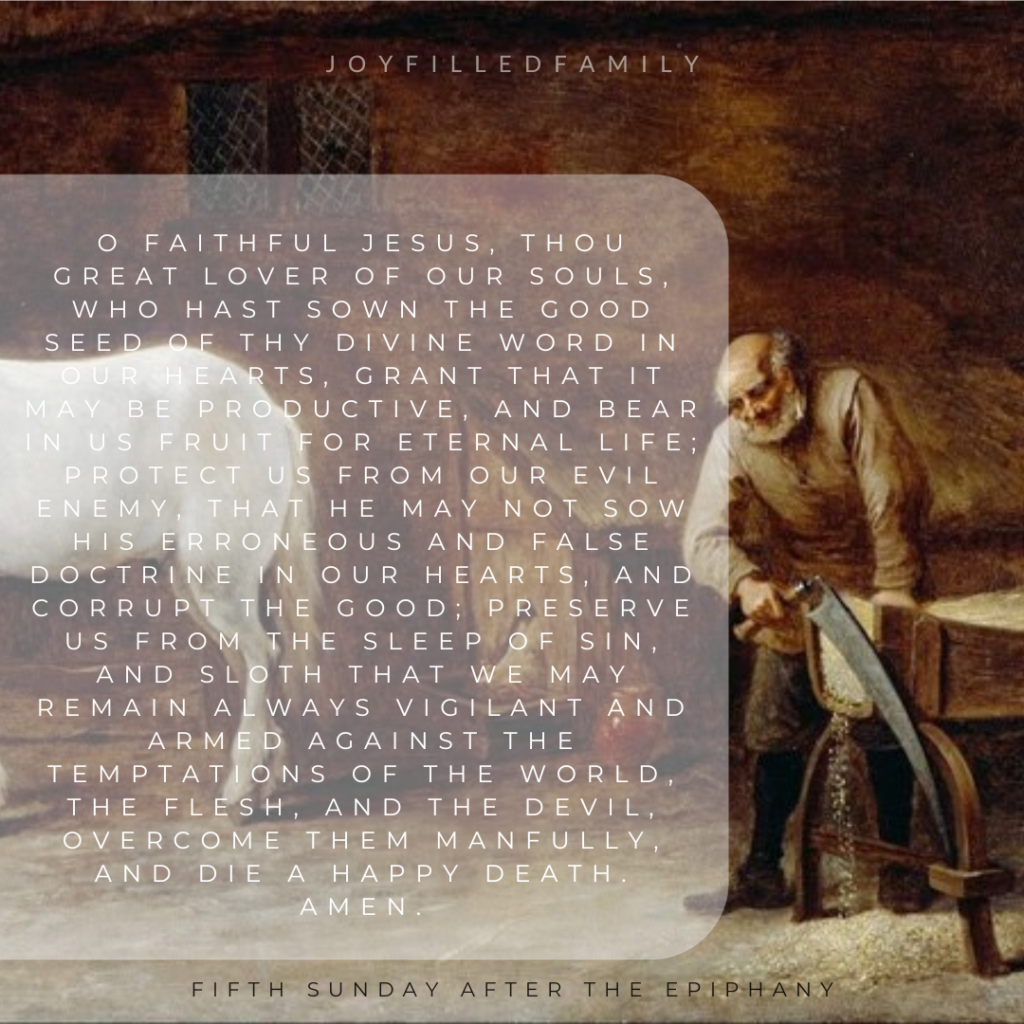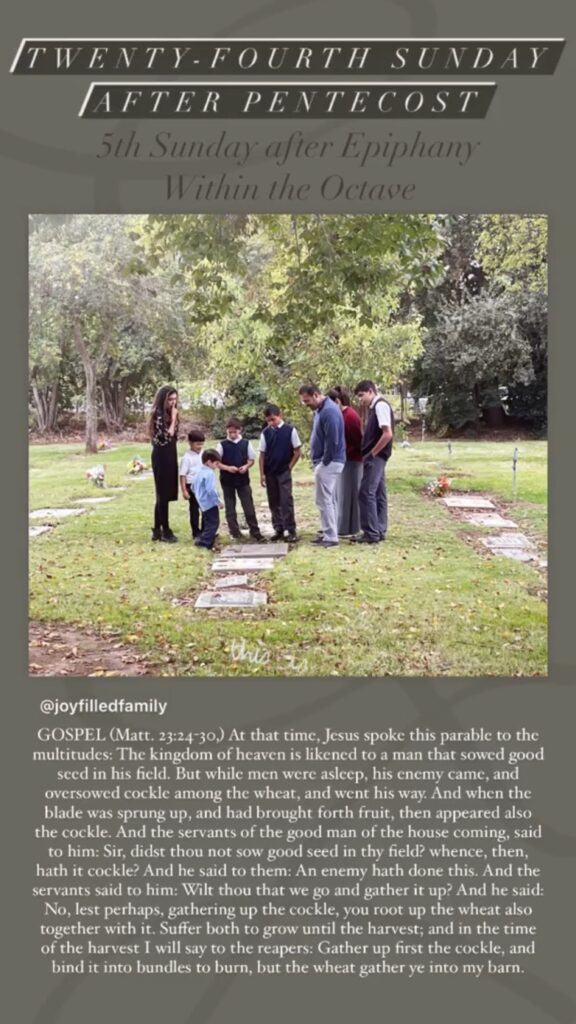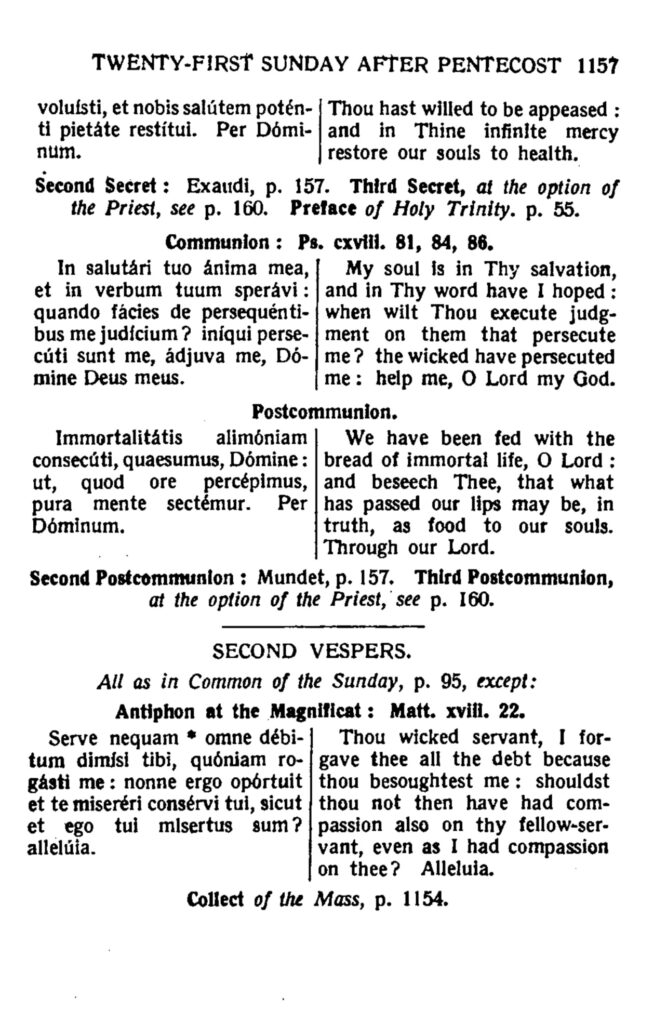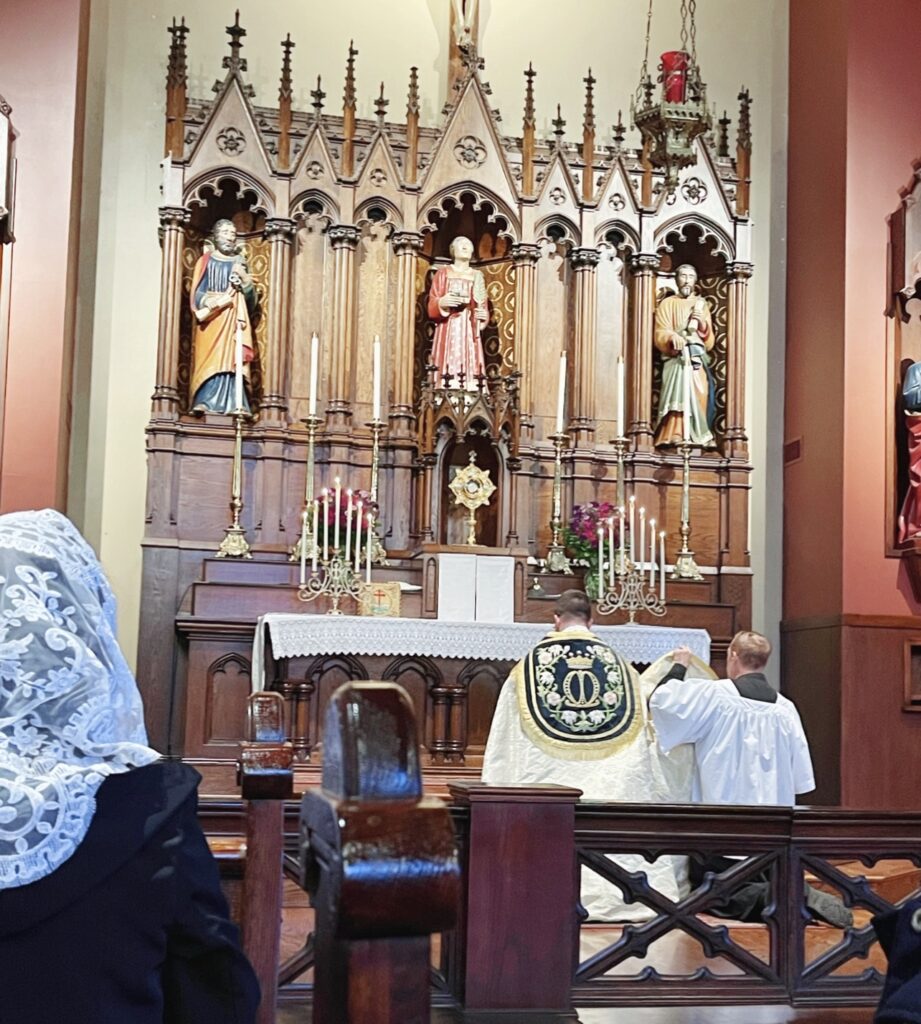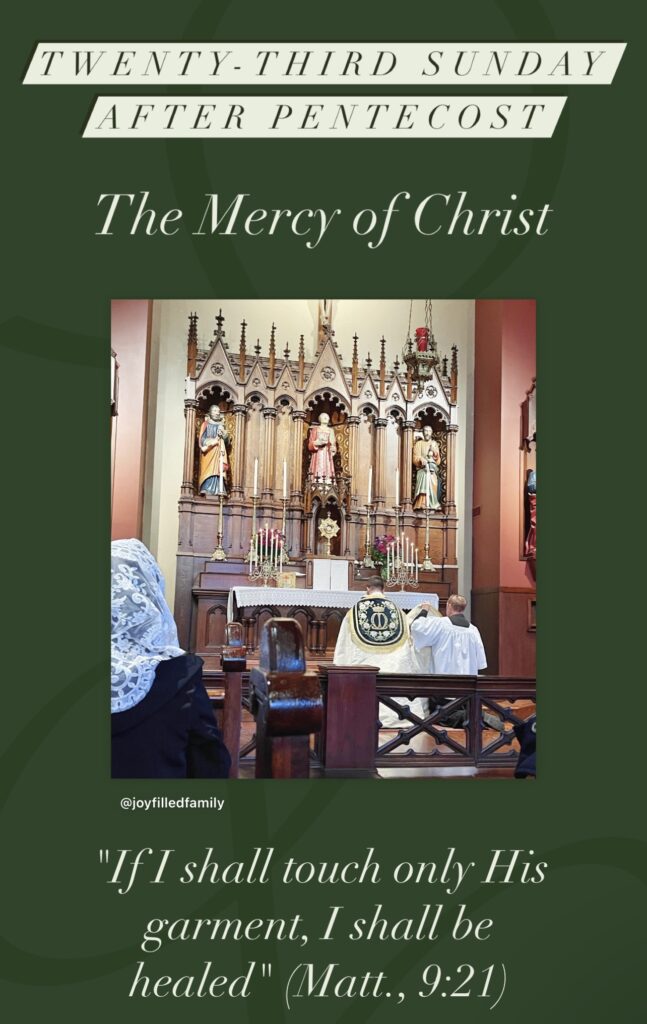25th Sunday after Pentecost – 6th Sunday after Epiphany
REMARKThe Mass of this Sunday is always the last, even if there are more than twenty-four Sundays after Pentecost; in that case the Sundays remaining after Epiphany, which are noticed in the calendar, are inserted between the twenty-third and the Mass of the twenty-fourth Sunday.
For the Introit of this day’s Mass see the Introit of the third Sunday after Epiphany.]
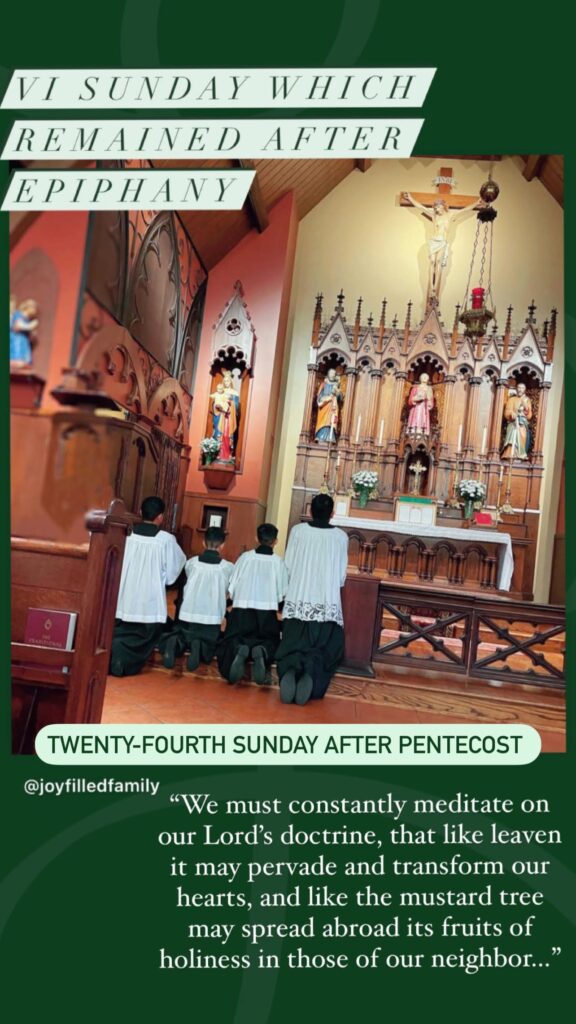
INTROIT Adore God, all ye His angels: Sion heard, and was glad; and the daughters of Juda rejoiced. The Lord hath reigned; let the earth rejoice; let the many islands be glad. (Ps. XCVI. 1.) Glory be to the Father, etc.
COLLECT Grant, we beseech Thee, Almighty God, that ever fixing our thoughts on such things as are reasonable, we may both in our words and works do what is pleasing in Thy sight. Through our Lord Jesus Christ, etc.

EPISTLE (I. Thess. I. 2-10.) Brethren, we give thanks to God for you all, making a remembrance of you in our prayers without ceasing; being mindful of the work of your faith, and labor, and charity, and of the enduring of the hope of our Lord Jesus Christ before God and our Father: knowing, brethren, beloved of God, your election: for our gospel hath not been unto you in word only, but in power also, and in the Holy Ghost, and in much fullness, as you know what manner of men we have been among you for your sakes. And you became followers of us and of the Lord, receiving the word in much tribulation, with joy of the Holy Ghost: so that you were made a pattern to all that believe, in Macedonia and in Achaia. For from you was spread abroad the word of the Lord, not only in Macedonia and in Achaia, but also in every place, your faith, which is towards God, is gone forth; so that we need not to speak anything. For they themselves relate of us what manner of entering in we had unto you; and how ye turned, to God from idols, to serve the living and true God, and to wait for His Son from heaven (whom he raised from the dead), Jesus, who both delivered us from the wrath to come.
EXPLANATION The apostle gives thanks to God in prayer for those inhabitants of Thessalonia, who have been converted to Christianity by his words, and declares to them his joy at their Christian life which they prove by their good works and their perseverance, even through all trials, in expectation of eternal reward through Christ. He assures them also of their salvation, (election) because God had caused the preaching of His gospel, which they so willingly received, to produce in them such extraordinary fruit. He praises them not only for having listened to the gospel and abandoned idolatry, but for having regulated their lives in accordance with the faith, and having become a model to distant nations, for the report of their faith had spread far, and everywhere their zealous reception of the gospel was spoken of. Would that the same could be said of all Christians!
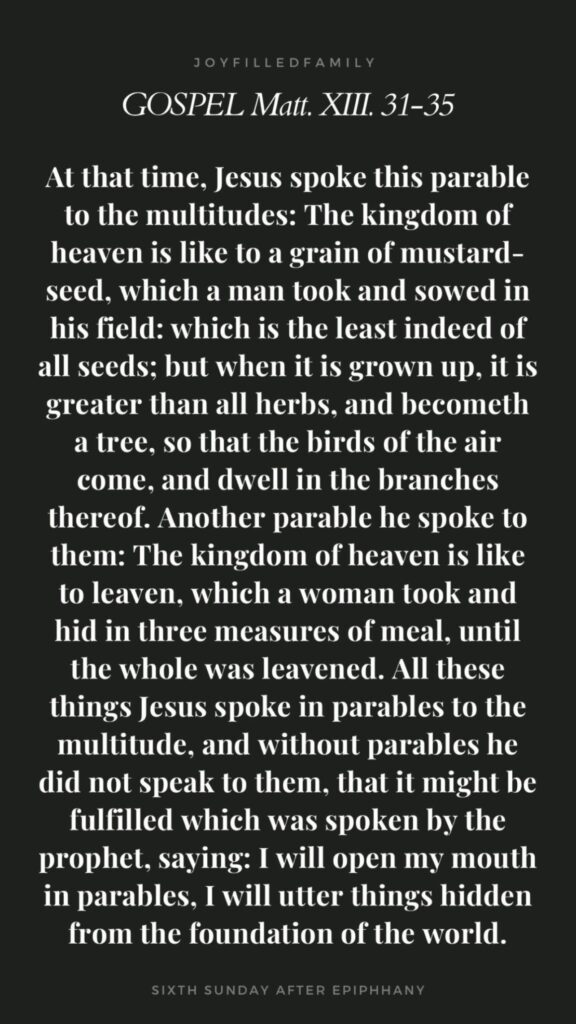
GOSPEL (Matt. XIII. 31-35.) At that time, Jesus spoke this parable to the multitudes: The kingdom of heaven is like to a grain of mustard-seed, which a man took and sowed in his field: which is the least indeed of all seeds; but when it is grown up, it is greater than all herbs, and becometh a tree, so that the birds of the air come, and dwell in the branches thereof. Another parable he spoke to them: The kingdom of heaven is like to leaven, which a woman took and hid in three measures of meal, until the whole was leavened. All these things Jesus spoke in parables to the multitude, and without parables he did not speak to them, that it might be fulfilled which was spoken by the prophet, saying: I will open my mouth in parables, I will utter things hidden from the foundation of the world.
What is here understood by the kingdom of heaven?
The Church and the doctrine of Christ.
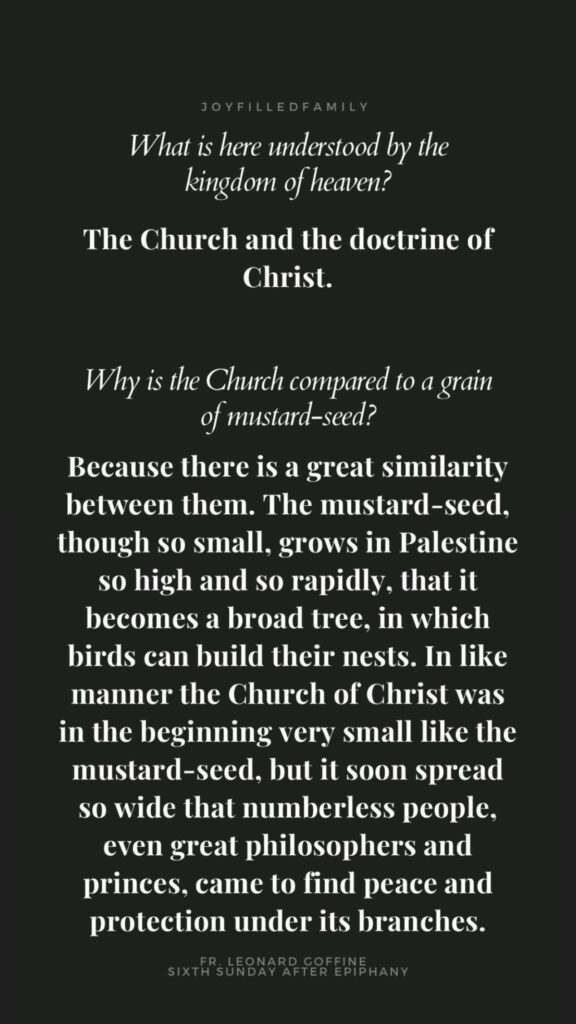
Why is the Church compared to a grain of mustard-seed?
Because there is a great similarity between them. The mustard-seed, though so small, grows in Palestine so high and so rapidly, that it becomes a broad tree, in which birds can build their nests. In like manner the Church of Christ was in the beginning very small like the mustard-seed, but it soon spread so wide that numberless people, even great philosophers and princes, came to find peace and protection under its branches.

Why is Christ’s doctrine compared to leaven?
Because like the leaven, which quickly penetrates the flour, and makes it palatable bread, the doctrine of Christ, spreading with surprising swiftness over the then known parts of the globe, gave the Gentiles a taste for divine things and for heavenly wisdom. Thus Christ’s doctrine penetrates him who receives it, sanctifies all his thoughts, words, and deeds, and makes him pleasing to God.
By what means, in particular, was the Church of Christ propagated?
By the omnipotence of God and the miracles which He so frequently wrought to prove the truth and divinity of the Christian religion; the courageous faith, and the pure moral life of the early Christians, which led many pagan minds to accept the doctrine of Christ; and the persecution of Christianity, for, as Tertullian says: “The blood of the martyrs was the seed of the Church.” The false doctrine of Mahomet, the erroneous teachings of Luther, Calvin, and earlier and later heretics have, it is true, also spread quickly far and wide; but this is not to be wondered at, for it is easy to lead people to a doctrine that encourages sensuality, and to which they are carried by their evil inclinations, as was the case with the doctrine of the impostor Mahomet, and three hundred years ago with the heresy of Luther; but to spread a doctrine which demands the subduing of the carnal, earthly inclinations, and to bend the will to the yoke of obedience to faith, something more than human eloquence is required. Thus, the Chancellor of England, Thomas More, who gave his blood for the true doctrine of Christ, wrote to Luther, who was boasting of the rapid increase of his sect: “It is easy to descend; seducing the people to a bad life is nothing more marvellous than that a heavy stone should fall of its own accord to the ground;” and Melanchton, a friend of Luther, in answer to his mother’s question, whether she should remain a Catholic or receive Luther’s doctrine, wrote : “In this religion it is easy to live, in the Catholic it is easy to die.”
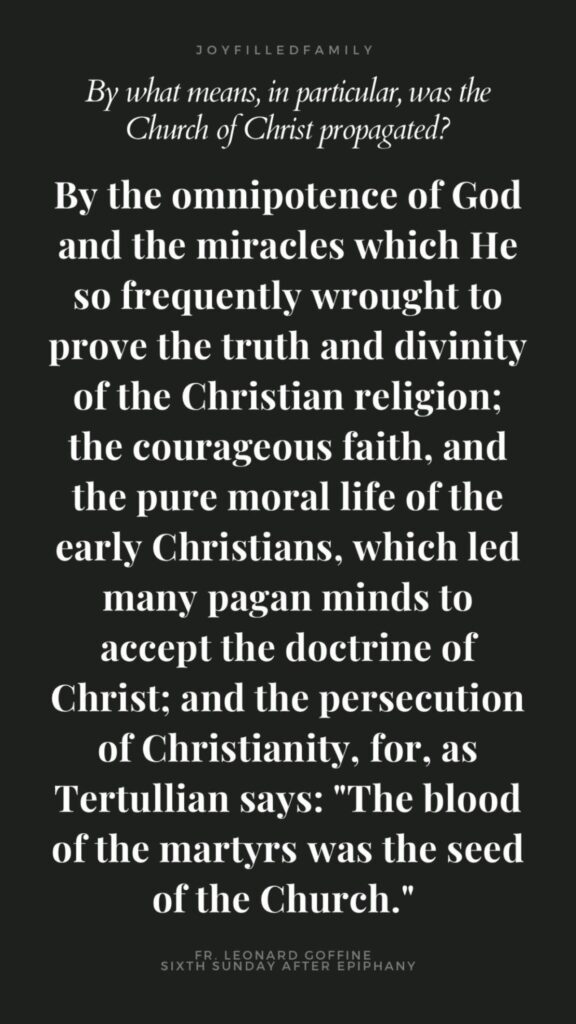
Why did Christ always speak in parables?
That His teaching by being simple might be more easily understood, and better remembered. He who is called upon to teach others, should, as did Christ, always speak to them according to their ability to understand, and by no means seek his own honor, but the honor of God, and the benefit of those who hear him.
PRAYER O most benign Jesus. How much do we give Thee thanks that Thou hast permitted us to be born in Thy holy Church, and instructed in Thy holy doctrine, which, like the mustard-seed, has grown to be a large tree, spreading over the whole earth. Grant that under the shadow of this tree, in Thy holy Church, we may ever rest securely, cling to her faithfully, and penetrated, as by leaven, with her doctrine may bring Thee pleasing fruits of faith and virtue. Amen.
